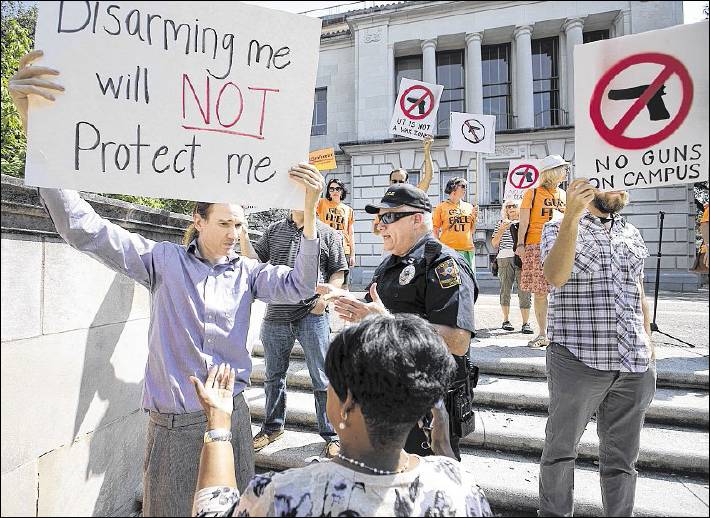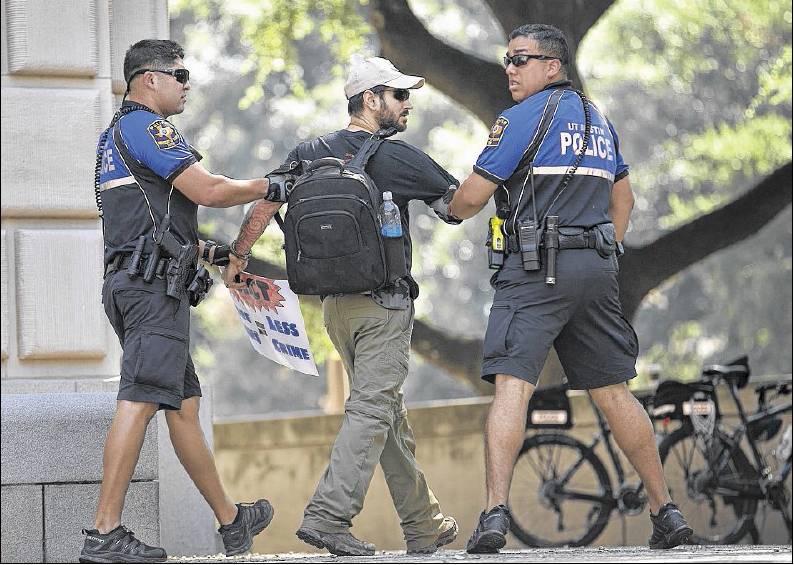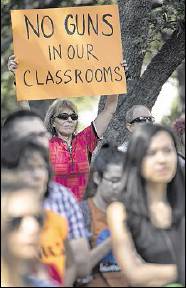FIRST ON STATESMAN.COM CAMPUS CARRY RULES
Passions high as UT, other schools face campus carry
Officials study limited gun-free zones with new law beginning in August 2016.
By Ralph K.M. Haurwitz rhaurwitz@statesman.com
As a retired admiral and Navy SEAL who directed the raid that killed Osama bin Laden, Bill McRaven appreciates guns. But he doesn’t think carrying them into buildings on college campuses is going to increase safety.
McRaven, chancellor of the 14-campus University of Texas System, lost that debate when the GOP-dominated state Legislature voted overwhelmingly earlier this year to expand the rights of people who have licenses to carry concealed handguns.
Now McRaven and other leaders of the state’s public institutions of higher learning
— including universities, health-related institutions and community colleges — are trying to figure out how to implement the new law. And as they engage in required consultation with students, faculty members and staff members before writing campus-specific rules, it’s clear that the passage of Senate Bill 11 did not defuse a highly charged issue.
Rally disrupted
A rally against the law Thursday on the West Mall of the Austin campus was disrupted by two counter-protesters who were arrested after they refused to leave, according to a campus spokeswoman. More than 150 faculty members have pledged to prohibit guns in their classrooms, regardless of what rules emerge. And at a forum that drew about 250 people Wednesday evening to UT’s Texas Union, speaker after speaker argued passionately for one side or another of the issue.
Holders of concealed handgun licensees have been allowed to carry weapons on the grounds of public institutions of higher learning since 1995. The new law allows them to carry in campus buildings.
But there’s a catch: Schools can write “reasonable rules” in light of “the nature of the student population, specific safety considerations, and the uniqueness of the campus environment.”
And there’s a catch to the catch: The rules may not “generally prohibit or have the effect of generally prohibiting license holders from carrying concealed handguns on the campus.”
In other words, schools can establish gun-free zones, but they must be limited.
The upshot is that schools might well wind up permitting guns in most classrooms and offices. And the law specifically allows for rules regarding the storage of handguns in campus dormitories.
“Our guiding principles are that we will follow the law, we will make our campuses as safe as we possibly can and we will try to keep angst as low as possible so people can focus on study, research and work on campus,” said David Daniel, the UT System’s deputy chancellor, who is leading weekly conference calls involving campus representatives.
Consensus sought
Daniel said officials hope to reach a consensus in the next few weeks on campus “exclusion zones,” which might include childcare centers, hospitals, schools on university grounds for kindergarten up to 12th grade and laboratories with potentially dangerous chemical or biological materials. “We have not gotten to dormitories or residence halls yet, but that’s on our list of issues to talk about, including how weapons would be stored,” he said.
Campus-level “working panels” are proceeding on a parallel track to gather information and opinions to make recommendations. Steve Goode, a law professor who chairs the UT-Austin panel, said more than 2,500 comments have been submitted online. “The overwhelming majority of comments we have received oppose Senate Bill 11,” he said.
Texas is among eight states that allow some form of campus carry, according to the National Conference of State Legislatures. Nineteen states ban concealed carry on campus, and 23 states do not have a policy or leave it to the discretion of colleges or governing boards.
“It has not turned out to be a major issue” at the University of Utah, Colorado State University and a number of other campuses with concealed carry that the working panel has studied, Goode said.
Weapons are nevertheless a matter of intense debate at colleges in particular and in the nation generally. That’s not likely to subside anytime soon, especially in light of a 20-year-old man’s shooting spree Thursday that left numerous people dead and injured at a community college in Oregon.
Special meaning at UT
The issue has special resonance at UT-Austin, in part because of its history. The new law takes effect Aug. 1, 2016, exactly 50 years after Charles Whitman opened fire from 230 feet up on the UT Tower in a rampage that ultimately took 16 lives, including those of his mother and wife, whom he stabbed to death.
The law goes into effect Aug. 1, 2017, for community colleges. Although it also applies to private colleges, they can opt out altogether.
Critics echo many of the concerns that McRaven cited during the legislative session, among them that the presence of handguns — even though limited to people at least 21 years old who have passed a background check, taken a class and passed a shooting test, and to military members or veterans under 21 — will lead to an increase in shootings, including accidental and self-inflicted wounds.
Joan Neuberger, a history professor, helped organize a group called Gun Free UT and is contemplating some sort of civil disobedience.
“I’m totally opposed to guns on campus at all,” Neuberger said. “I think it’s very dangerous to have guns in classrooms in particular” because emotions often run high as students debate each other on all manner of issues.
“I’ve pledged to prohibit guns in my classroom, but I haven’t decided what that means for me,”she said. “I’m really hoping President (Gregory L. ) Fenves will exclude guns from classrooms so it won’t become an issue.”
Supporters of the law argue that concealed handguns will go largely unnoticed as they are in many grocery stores, houses of worship and other places where they are permitted.
“We are not vigilantes,” said Justin Stone, a first-year law student. “We are not a danger to this campus. We are not bad guys you read about in the news. CHL holders have proven to be trustworthy with a firearm.”
Texas State University and Texas A&M University aren’t as far along as UT in planning for the new law. Both schools have formed advisory panels but have not scheduled campus forums.
A&M President Michael Young was president at the University of Utah in 2006 when, in a case he inherited from the previous administration, the Utah Supreme Court ruled that the school had no authority to ban guns, which it had done for many years.
Some people feel safer if they have access to a weapon, while other people find their presence disconcerting, Young said. He declined to speculate on how A&M’s rules might look, adding: “We’ll do all we can to make everybody feel as comfortable as they can knowing all sides will have to compromise at certain levels.”
Contact Ralph K.M. Haurwitz at 512-445-3604.
Twitter: @ralphhaurwitz


